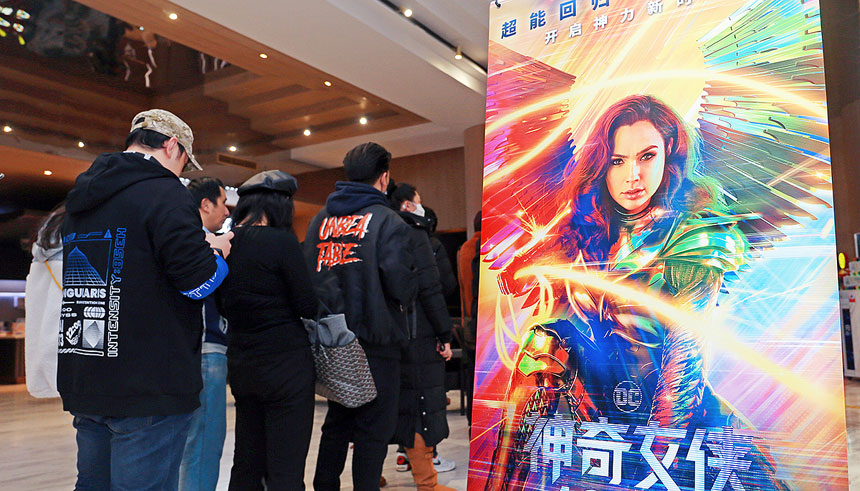U.S.-Asia Business
US-China Market Watch: US Adds to Blacklist, China’s Digital Yuan, Wonder Woman 1984
By

Your monthly roundup of the latest US-China business and industry news.
U.S. adds SMIC and dozens of other Chinese firms to Entity List
In an escalation of U.S.-China trade tensions, the United States Commerce Department added dozens of Chinese firms onto the Entity List, which requires businesses to have licenses in order to export U.S. technology to any firm on the list. The entities now include China’s biggest chipmaker, Semiconductor Manufacturing International Corp (SMIC), and leading manufacturer of civilian drones, SZ DJI Technology.
Despite the tensions, foreign investment in China is set to reach another record high in 2020, according to the Chinese Commerce Ministry. The Chinese government appears to be making strides in encouraging further investment, such as publishing a shortened list of restricted markets. According to Bloomberg, several surveys have indicated that U.S. companies intend to remain in China, despite Washington’s attempts to bring production back to the U.S.
China encourages foreign investment and expands digital currency
In an effort to continue attracting foreign capital to the country, China has increased the number and type of items on its industry catalogue. The revised list focuses on attracting investment to its manufacturing and producer services industries, so that China can build sustainable and self-reliant supply chains and boost local innovation. The list now includes new items like medical equipment such as ventilators, technology related to 5G, and services like high-end equipment maintenance.
China is also on track to become the first country to have a widespread rollout of a digital currency, after the People’s Bank of China wrapped up its second digital currency pilot program in Suzhou. The Suzhou pilot not only doubled the number of residents who received the currency, but it also tested the digital yuan in online stores such as JD.com and introduced an electronic payment method that doesn’t require internet connection.
China’s central bank developed its digital currency to break up the control Alibaba and Tencent have over the Chinese payments industry and to gain more access to transaction data, which could help authorities track money flows.
“Wonder Woman 1984” has lackluster performance in China
The highly anticipated sequel to DC Films’ 2017 blockbuster “Wonder Woman” disappointed at the Chinese box office its opening weekend. “Wonder Woman 1984” earned $18 million in its first weekend but then dropped 92% to $1.5 million the following weekend. Instead, local titles took the lead, with Hong Kong action film “Shock Wave 2” and Chinese fantasy “Dream of Eternity” earning $64.5 million and $39 million, respectively. However, “Wonder Woman 1984” performed better at the U.S. box office, bringing in $16.7 million and marking the highest opening weekend since the COVID-19 pandemic started.
In October, China surpassed North America to become the world’s largest box office, thanks to its successful handling of the pandemic. Since most major Hollywood films have been pushed back, local Chinese titles have taken over the Chinese box office, making up four out of the top five films of 2020 (Christopher Nolan’s “Tenet” was the sole Hollywood film to make it).
IMAX expands footprint in China
IMAX has struck a deal with Chinese movie theater chain JinYi Media that includes upgrading seven of JinYi’s existing IMAX theaters and installing IMAX systems at five new sites. The deal would bring a total of 989 IMAX screens to China.
Despite the box office downturn in North America, IMAX has bolstered its presence in China. In the press release, IMAX was noted as being a “significant driver of the [movie] industry’s rebound in China” and has managed to increase attendance by 23%, despite China implementing a 75% capacity limit in theaters. “The Eight Hundred,” the year’s highest grossing film, was also entirely shot on IMAX cameras.
Tencent doubles stake in Universal Music
A consortium of investors led by Chinese tech company Tencent is planning to double its stake in Universal Music Group (UMG). The consortium, which includes Tencent Music Entertainment, will buy an additional 10% equity stake from UMG’s parent company, Vivendi SA, which will value UMG at $36.8 billion. The deal is expected to close in the first half of 2021, pending regulatory approvals.
Tencent also has stakes in music streaming service Spotify and Warner Music Group.
Apple removes thousands of video game apps from China store
Under pressure from the Chinese government, Apple has removed 39,000 video game apps from its store in its largest single-day removal. The removed games include popular titles like “Assassin’s Creed Identity” and “NBA 2K20.” Research firm Qimai said that only 74 of the top 1,500 paid games remained after the purge.
Since 2016, Beijing has required developers to receive licenses for their video games before release, but developers were able to use a loophole in Apple’s app store to get around that. The Cupertino-based company did not state why they started purging their store, but it comes on the heels of the Chinese government’s crackdown on tech companies.
Click here for more US-China news updates

